The following chart introduces the sounds of Hul'q'umi'num' and the new alphabet.
| ' (apostrophe) | 'unuhw | glottal stop |  |
'Unuhw is a catch in the throat, a sudden beginning or end. |
| a | thathun | mouth | 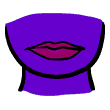 |
a is pronounced much like the a in the English word "father". |
| aa | spaal' | raven | 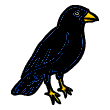 |
aa is pronounced like the Hul'q'umi'num' a, but it is held longer. |
| ch | chukuns | chicken | 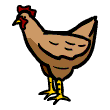 |
ch is pronounced as in the English word "cheap". |
| ch' | ch'ekwxul's | frying | 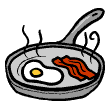 |
ch' is pronounced like ch, but it is glottalized, so it is made with a popping sound. This sound is quite rare in Hul'q'umi'num'. |
| e | sq'ewum | knee | 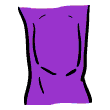 |
e has three main pronunciations. In most contexts it is pronounced like the vowels in the English words "bet" or "bait". When it is at the end of a word, or followed by q, q', x, or 'unuhw, e is pronounced like the vowel in the English word "bat". |
| ee | smeent | mountain |  |
ee is pronounced like the Hul'q'umi'num' e, but it is held longer. |
| h | hilum | to fall (from a height) |
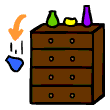 |
h is pronounced as in the English word "heat". |
| hw | hwulmuhw | First Nations | 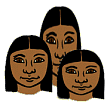 |
hw is pronounced much like the wh in the English word "which" for speakers who pronounce "which" differently from "witch". The back of the tongue is in the position for k, but it does not quite touch the roof of the mouth, so a hissing sound is produced. The lips are rounded as in making a w sound. |
| i | suplil | bread | 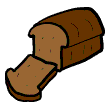 |
i is similar to the vowel sound in the English words "meet" and "meat". |
| ii | siiye'tun | widows | 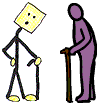 |
ii is similar to the Hul'q'umi'num' i, but it is held longer. |
| k | kupou | coat | 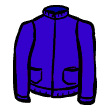 |
k occurs in borrowed words such as kupou "coat" (from French), and is pronounced as in the English word "key". |
| kw | kwasun | star |  |
kw is pronounced the same as qu in the English word "queen". |
| kw' | kw'aant' | dolphin, porpoise | 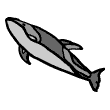 |
kw' is pronounced like the Hul'q'umi'num' kw, but it is glottalized, so it pops. |
| l | lelum' | house |  |
l is pronounced like the l in the English word "long". |
| lh | lhqelts' | moon | 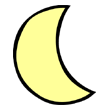 |
lh is made by holding the tongue as in l but producing a sound more like sh. This is done by holding one or both sides of the tongue a little ways away from the back teeth so some air can pass by, making a hissing sound. |
| m | mumuxelh | caterpillar | 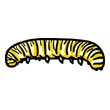 |
m is pronounced as in the English word "meet". |
| n | nuts'a' | one | 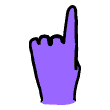 |
n is pronounced as in the English word "neat". |
| o' | s'ey'o' | abalone shell | 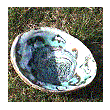 |
o' is used in preference to uw' at the end of words or syllables. There is no English equivalent to this sound. Note: The Cowichan Tribes spell this word s-ey'o'. |
| oo | qw'oon' | ear | 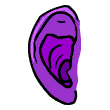 |
oo is pronounced as in the English word "moon", but it is held longer. It is the long version of ou. |
| ou | pous | cat | 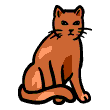 |
The letter pair ou is pronounced like the oo in the English word "hoot" (but without the w sound at the end). Hul'q'umi'num' words with this sound have come in from French, Chinook Jargon, or English. |
| p | putenum | to sail | 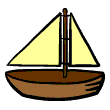 |
p is pronounced like the p in the English word "put". |
| p' | p'utth'tun | needle | 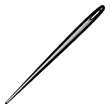 |
p' is pronounced like p, but it is glottalized, so it pops. |
| q | qeq | baby | 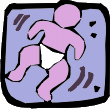 |
q is pronounced a bit like the English k sound, but the tongue is pulled much farther back in the throat. The back of the tongue touches the soft palate near the uvula. |
| qw | qwal | speak, talk | 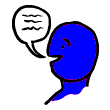 |
qw is pronounced like the Hul'q'umi'num' q, with the lips rounded as when making the w sound. |
| q' | q'e'mi' | girl (teenage) | 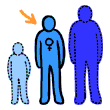 |
q' is pronounced like the Hul'q'umi'num' q, but it is glottalized, so it pops. |
| qw' | qw'uyulush | to dance | 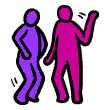 |
qw' is pronounced like the Hul'q'umi'num' qw, but it is glottalized, so it pops. |
| s | s'axwa' | butterclam | 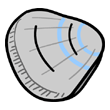 |
s is pronounced like the s in the English word "sit" (never like the z sound in "hose"). Note: The Cowichan Tribes spell this word s-axwa'. |
| sh | shuptun | knife | 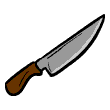 |
sh is pronounced as in the English word "shore". |
| t | telu | money | 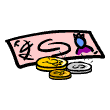 |
t is pronounced as in the English word "take". |
| t' | t'xum | six | 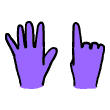 |
t' is pronounced like t, but it is glottalized, so it pops. |
| th | thqet | tree | 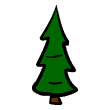 |
th is pronounced as in the English word "thin" (but never as in "then"). |
| tl' | tl'elhum | salt | 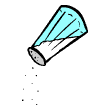 |
tl' is made by holding the tongue as for an l sound and making a sort of clicking sound by releasing the side or sides of the tongue. |
| ts | tselush | hand | 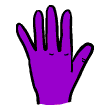 |
ts is pronounced as a single sound, much like in the English word "bats". |
| ts' | ts'e'wi' | dish, bowl, plate | 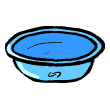 |
ts' is pronounced like the Hul'q'umi'num' ts, but it is glottalized, so it pops. |
| tth | tthu si'lu | the grandfather | 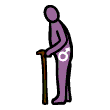 |
tth is pronounced as a single sound which is much like the English t plus th in the phrase "cut thin". This sound only occurs in Hul'q'umi'num' in a small number of grammatical marker words called articles. Some speakers use a plain t sound in the articles - e.g., tu si'lu. |
| tth' | tth'upsi'athun' | squirrel | 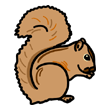 |
tth' is pronounced like the Hul'q'umi'num' tth, but it is glottalized, so it pops. |
| u | 'un' swetu | your sweater | 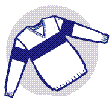 |
u is pronounced much like the u in the English word "butter". |
| w | wech | watch | 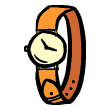 |
w is pronounced as in the English word "will". |
| x | xul'tun | pen, pencil | 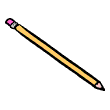 |
x is pronounced with the back of the tongue near the back of the roof of the mouth. The tongue does not actually touch the roof of the mouth, so a hissing sound is produced. |
| xw | xwi'lum' | rope | 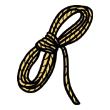 |
xw is pronounced like the Hul'q'umi'num' x, but with the lips rounded as when making the w sound. |
| y | yunus | teeth | 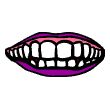 |
y is pronounced as in the English word "yellow" (never as in "why"). |